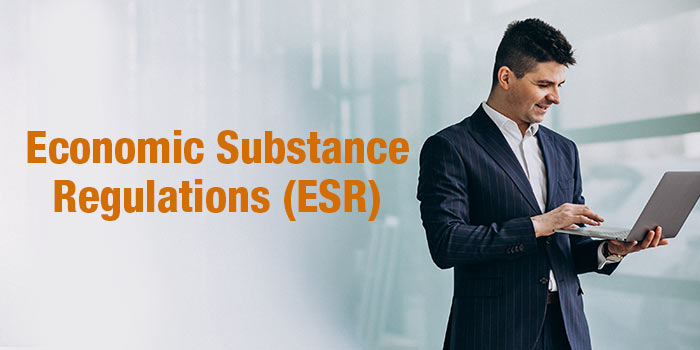[vc_row][vc_column][vc_column_text]
United Arab Emirates has always been a go-to place for businesses across the world, the major attractions being its ease of conducting business and Tax-Free environment. Being a Global Hub of business, UAE is currently directed towards adapting Global Tax Practices still maintaining its charm. The introduction of VAT and Corporate Tax are major steps to this along with other compliance requirements such as Economic Substance Regulations, Anti Money Laundering Act, Ultimate Beneficial Owner filing, and Country by Country Reporting.
[/vc_column_text][/vc_column][/vc_row][vc_row][vc_column][vc_column_text]
Background to introduction of Economic Substance Regulations:
- To confirm with the standards set by Organization for Economic Cooperation and Development (OECD) established in 1961 with respect to Base Erosion and Profit Shifting (BEPS) on harmful tax practices.
- To be removed from European Union’s list of non-cooperative tax jurisdictions to support their effort for tax governance at a global level.
- To be able to demonstrate substantial economic activity and presence in the state so as to justify that the entity’s existence is not merely for profit shifting from a higher tax jurisdiction.
As a member of BEPS inclusive framework, UAE has introduced ESR Guidelines to curb harmful tax practices. The Cabinet decision no 31 of 2019 in April 2019 was introduced with this purpose, which was later subrogated by Cabinet resolution no 57 of 2020 (the ‘’ amended ESR’’) on 10th August 2020. Along with this, Ministerial Decision No. 100 of 2020 was issued for further guidance to implementation.
[/vc_column_text][/vc_column][/vc_row][vc_row][vc_column][vc_column_text]
Applicability:
To all licensees and exempted licensees both onshore and free zone including financial free zone businesses carrying out relevant activities from 1st Jan 2019.
Note: Natural persons, sole proprietorship, trust and a foundation will not be treated as licensees for the purpose of ESR.
Relevant Activities under ESR compliance
- Banking business
- Insurance business
- Leasing-Financing
- Intellectual property business
- Holding company business
- Head Quarter Business
- Shipping company business
- Investment Fund Management business
- Distribution and Service Centre Business
Why these nine activities?
According to OECD’s analysis these are ‘Geographically Mobile Income’, that essentially means that they have the potential of being performed in any jurisdiction without there being a need to actively demonstrate substance and the guiding principle behind this resolution is to demonstrate substance.
Who is Exempted Licensee as per Cabinet Resolution No 57 of 2020?
- Investment Funds
- Underlying Special Purpose Vehicles and Investment Holding Entities of Investment Funds
- A licensee tax resident in a jurisdiction other than UAE
- Wholly UAE Resident owned UAE entities carrying out only domestic transactions and are not part of MNE group
- UAE branches of foreign entity whose relevant income is subject to tax in such foreign jurisdiction
A Substance over form approach should be undertaken in determining whether the licensee is carrying out relevant activity rather than merely looking the commercial license activities.
[/vc_column_text][/vc_column][/vc_row][vc_row][vc_column][vc_column_text]
Reportable Period:
The Regulations applies to Licensees from financial year commencing on or after 1 January 2019.
The ESR Assessment
- Check whether entity is carrying out relevant activity using a substance over form approach.
- Check whether entity performs Core Income Generating Activities in relation to the relevant activity in UAE.
- Check if Licensee earns any gross income from its relevant activities during the relevant period.
- Check whether the entity is managed and directed in the state in relation to such activities.
- Check whether entity employs adequate number of qualified employees or incurs adequate operating expenditure and has adequate tangible assets in the state.
- If CIGA is carried out by another entity, check whether the licensee has full control and is able to monitor the activities of that entity.
It is important to note that even passive income from any of the relevant activity would require entity to comply with the regulation.[/vc_column_text][/vc_column][/vc_row][vc_row][vc_column][vc_column_text]
AUTHORITIES FOR MONITORING ESR:
Relevant Regulatory Authority
- Collecting information through notification, report and supporting documents.
- Review information obtained
- Undertake assessment on information received from exempt licensees.
National Assessing Authority (FTA)
- Undertake assessment to determine ES test
- Impose administrative penalties
- Hear and carry out appeals.
Competent Authority : Ministry of Finance
Foreign Competent Authority : Relevant authority of such other foreign jurisdiction.[/vc_column_text][/vc_column][/vc_row][vc_row][vc_column][vc_column_text]
COMPLIANCE REQUIREMENTS UNDER ESR:
- All licensees and exempted licensees to file notification confirming the relevant activity being carried out and corresponding income generation.
- Further to assessment and conclusion that the relevant activity generates income during the relevant period, every licensee should submit ES report to the regulatory authority demonstrating its substance.
Exempted licensees should also provide all information so as to claim the exemption status.
When to file Notification and Report?
Notification: Within 6 months from the end of the FY
Report: Within 12 months from the end of the FY[/vc_column_text][/vc_column][/vc_row][vc_row][vc_column][vc_column_text]
PENALTIES FOR NON COMPLIANCE:
| Reason | ESR Notification | ESR Report |
| Failure to submit before due date | AED 20,000 | AED 50,000 |
| Submission of inaccurate/incorrect information | AED 50,000 | AED 50,000 |
| Subsequent failure in second year | Penalty would be increased to AED 400,000 |
[/vc_column_text][/vc_column][/vc_row][vc_row][vc_column][vc_column_text]
How elevate can help you?
Comprehensive Initial Assessment in relation to applicability of the regulation
Evaluation and Gap Analysis for analyzing whether the business fulfills the economic substance test and identifying any non-compliant aspects.
Compliance Assistance to assist you in complying with law by filing the notifications and the reports with the MOF thus helping you avoid penalties and supporting in preparing any documentation or information required to be submitted to the authorities.
Waver of penalties to help and assist you waver any imposed penalties.
Continuous review services to ensure the licensee complies with the regulations.[/vc_column_text][/vc_column][/vc_row][vc_row][vc_column][vc_column_text css=”.vc_custom_1653397466440{padding-top: 30px !important;padding-right: 30px !important;padding-bottom: 30px !important;padding-left: 30px !important;background-color: #019b13 !important;border-radius: 15px !important;}”]
Call for Consultation
CA Gayathri PS
MOB: +971 55 101 6293
Email: gayathri@elevateauditing.com
[/vc_column_text][/vc_column][/vc_row]

